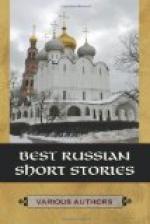After the soldiers had disappeared beyond the bend toward the woods, people came hurrying to the spot of the shooting, though till then not a soul had been in sight.
The bodies lay at the roadside on the other side of the railing, where the snow was clean, brittle and untrampled and glistened cheerfully in the bright atmosphere. There were three dead bodies, two men and a boy. The boy lay with his long soft neck stretched on the snow. The face of the man next to the boy was invisible. He had fallen face downward in a pool of blood. The third was a big man with a black beard and huge, muscular arms. He lay stretched out to the full length of his big body, his arms extended over a large area of blood-stained snow.
The three men who had been shot lay black against the white snow, motionless. From afar no one could have told the terror that was in their immobility as they lay there at the edge of the narrow road crowded with people.
That night Gabriel Andersen in his little room in the schoolhouse did not write poems as usual. He stood at the window and looked at the distant pale disk of the moon in the misty blue sky, and thought. And his thoughts were confused, gloomy, and heavy as if a cloud had descended upon his brain.
Indistinctly outlined in the dull moonlight he saw the dark railing, the trees, the empty garden. It seemed to him that he beheld them—the three men who had been shot, two grown up, one a child. They were lying there now at the roadside, in the empty, silent field, looking at the far-off cold moon with their dead, white eyes as he with his living eyes.
“The time will come some day,” he thought, “when the killing of people by others will be an utter impossibility The time will come when even the soldiers and officers who killed these three men will realise what they have done and will understand that what they killed them for is just as necessary, important, and dear to them—to the officers and soldiers—as to those whom they killed.
“Yes,” he said aloud and solemnly, his eyes moistening, “that time will come. They will understand.” And the pale disk of the moon was blotted out by the moisture in his eyes.
A large pity pierced his heart for the three victims whose eyes looked at the moon, sad and unseeing. A feeling of rage cut him as with a sharp knife and took possession of him.
But Gabriel Andersen quieted his heart, whispering softly, “They know not what they do.” And this old and ready phrase gave him the strength to stifle his rage and indignation.
II
The day was as bright and white, but the spring was already advanced. The wet soil smelt of spring. Clear cold water ran everywhere from under the loose, thawing snow. The branches of the trees were springy and elastic. For miles and miles around, the country opened up in clear azure stretches.




